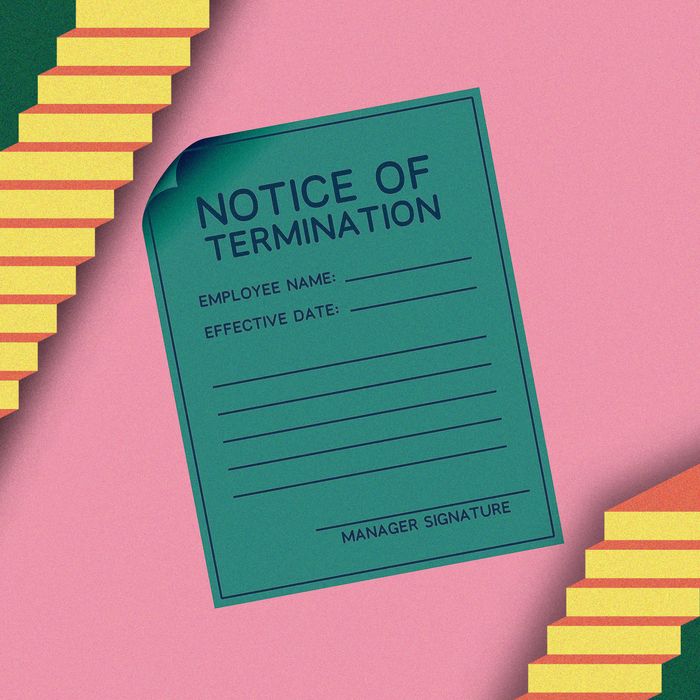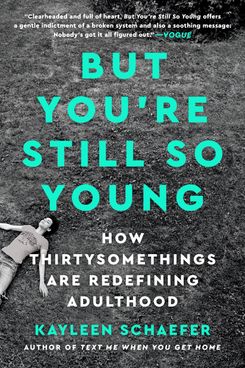
By my early 30s, I’d been living in New York City since my mid-20s, focused mostly on my career as a writer, the one thing I was absolutely sure I wanted. I thought that after I solidified my career and my finances, I’d be ready to get married and have children. I thought this even though I was terrified of the compromises I might have to make. What if my theoretical husband wanted to leave New York? How would I balance working with taking care of my theoretical children? Still, I told myself that once I felt secure in my work, I’d be ready to build the rest of what I thought my life should look like from there. Some part of me thought it would happen automatically, as if all the momentum I needed to fill out the rest of my list would come from hitting my professional stride.
By the time I was 33, I’d worked my way to my first high-up position on a magazine masthead. I was a senior editor and psyched about the word “senior” being in my title. This was the grounding I was looking for.
Then one Wednesday, right after lunch during what felt like an ordinary workday, my boss called.
“Could you come up to the conference room?” she asked.
When I got there, a woman I’d never seen before said she was from human resources and asked me to sit. Before I had my butt fully in the chair, she said, “Your position is being eliminated.” I was wearing fake leather pants and a sweater with holes in it, an outfit that made me immediately self-conscious. How stupid had I been to think I was a professional with a stable career? They gave me some papers, and I went back to my office and tried not to cry as I looked around for what I wanted to take with me immediately. I grabbed a giant bag of yogurt-covered pretzels I’d bought earlier that week to have as a snack at my desk, which only made me feel more ridiculous and despondent. Then I walked out of the building into a clear, sunny spring day and thought, My life is ruined.
All I’d worked for had been taken away in a conference room in less than five minutes.
It only got worse when, on the street, I called my parents to tell them what happened. My dad answered the phone and, after hearing the news, said, “Well, what are you going to do? Do you have a plan?”
I didn’t, and in that moment, I felt like I didn’t have anything. I thought my career was gone, and since I’d been building everything on that, I didn’t have anything else.
I remember crying to my boyfriend after I got fired, “How am I going to get maternity leave now?” even though I wasn’t actually sure I wanted to have kids — that’s how hamstrung I was by this life order I’d set up for myself and my belief that after I had anchored my career, I would be comfortable deciding on everything else.
My life is nothing like I expected, I thought.
A lot of us are certain we’re screwing up adulthood. The writer Kelly Williams Brown came up with the term “adulting” when she was feeling like her life was completely unmanageable. Everyone around her seemed so focused and accomplished, driven to push themselves more every day, while she never remembered to buy toilet paper and was using mosquito repellent to keep her cat’s fleas from biting her.
“I felt so out of control and messy and bad,” she says, “and the truth was that, relatively speaking, I really wasn’t doing very poorly at all. I was working in the field I had gone to school for. I had a cat, some furniture. It’s not like I was feral on the street, but I still really felt like I was just a mess.”
She set out to write the book Adulting: How to Become a Grown-up in 468 Easy(ish) Steps to help people like her who wanted to feel like their lives had forward momentum. But when she began asking people she thought were inspirational for their suggestions, “I started to realize that everyone else also felt like they were messes,” she says. Every single person she tried to interview would tell her, “You don’t want to talk to me. I’m not a real adult.” “And I would be like, ‘You’re a surgeon! What are you talking about?’” Williams Brown says.
The book came out in 2013, and since then the word “adulting” has evolved into a cutesy verb that means performing tasks that seem grown-up, like making a dentist appointment or boiling an egg. It’s become more of a way to show off, as much as anyone can show off that they’re wearing matching socks or making dinner, than a way to soothe the internal ickiness of fearing that you don’t have your shit together.
“‘Adulting’ as a word really annoys me now,” Williams Brown says.
But that doesn’t mean the unease she was trying to tap into isn’t at the red-hot center of many of us and, in fact, the people who seem the most like they have secure lives can often feel the least like they do. But unless they express their feelings, it’s hard to believe they’re not doing better than you. “We’re always going to compare our own lives to our very shallow, uninformed impression of someone else’s life because we don’t have access to anyone else’s interior life,” Williams Brown says.
In the weeks and months after my job was eliminated, I couldn’t find another job and started working on my own as a freelance writer, which meant that I no longer had a job that seemed like an actual job. When I’d tell people I was freelancing, their reaction, either implicitly or explicitly, was that I was just waiting until someone offered me a real job.
My boyfriend and I broke up. He wanted me to move to his city, since he was the one who still had a corporate job, but I didn’t want to: That seemed like admitting failure, a retreat that I was forced into because I couldn’t make my own career happen.
I started to spend a lot of time by myself. In the beginning I was working more than ever, panicked about money, but also grasping for something work-related that would make me feel as centered and capable as I had before I’d been fired.
It was exhausting, but it could also be exhilarating. What I hadn’t considered about no longer having a corporate job was that I was also no longer in a box. I was doing different kinds of writing than I’d done before, work that I thought was good. I was stretching my skills and getting a buzz like, I didn’t know I could do that. It wasn’t a perfect upswing. I was also unprotected, uncertain, and prone to crying sometimes, especially at the end of the day when the buzz wore off and what I heard in my head instead was, What am I doing?
But I also wasn’t ready to quit. I kept writing without the security of working for the same place each day and started to feel a lot better about it — and about my life. I’d been trying to get to a solid career so I could launch the rest of what I thought my life had to be, but now I had to let that go. I no longer had a precise answer to what I did. It wasn’t going to be what would propel me to marriage, buying a home, having children, or simply feeling like an established adult.
I was untethered from the list I thought I was following and existing just as I was. For so long, I’d been forcing this image of what my life had to look like, but then suddenly, I couldn’t pretend all of that was around the corner anymore — or that I even wanted it to be.
When I separated the strands of what I assumed my life would look like from how it actually did, a surprising thing happened: I felt free. Around this time I bought myself a cell-phone case with a motivational message that read, What if I fall? / Oh but my darling, What if you fly?
My best friend, Ruthie, rolled her eyes at it. “But I guess you’re going through some stuff,” she said, which made me laugh.
I didn’t feel like I was flying. Just because I no longer assumed my traditional adulthood would snap into place didn’t mean that I wouldn’t want one eventually. I might seek a less volatile career. I could want to live in a home that didn’t feel temporary. I might want to get married. I could want to have children. I hadn’t forgotten what was on my list. But I did sort of feel like I was floating. I wanted to have all kinds of experiences and joys and loves, and I had to figure out what those were for myself.
From But You’re Still So Young: How Thirtysomethings Are Redefining Adulthood by Kayleen Schaefer with permission from Dutton, an imprint of the Penguin Publishing Group, a division of Penguin Random House, LLC. Copyright © 2021 by Kayleen Schaefer.


